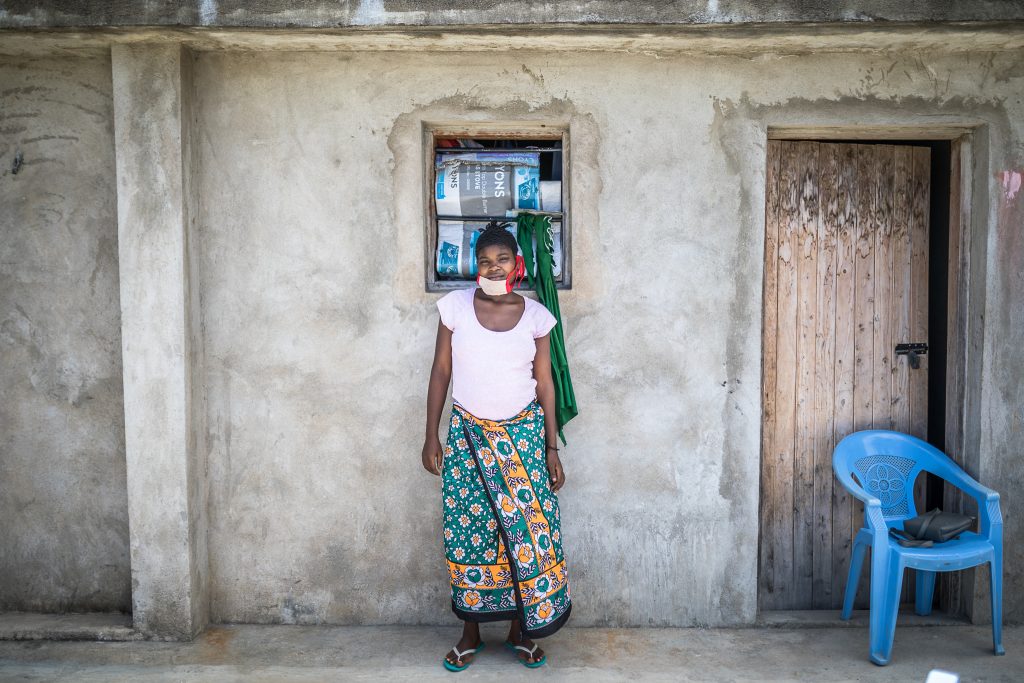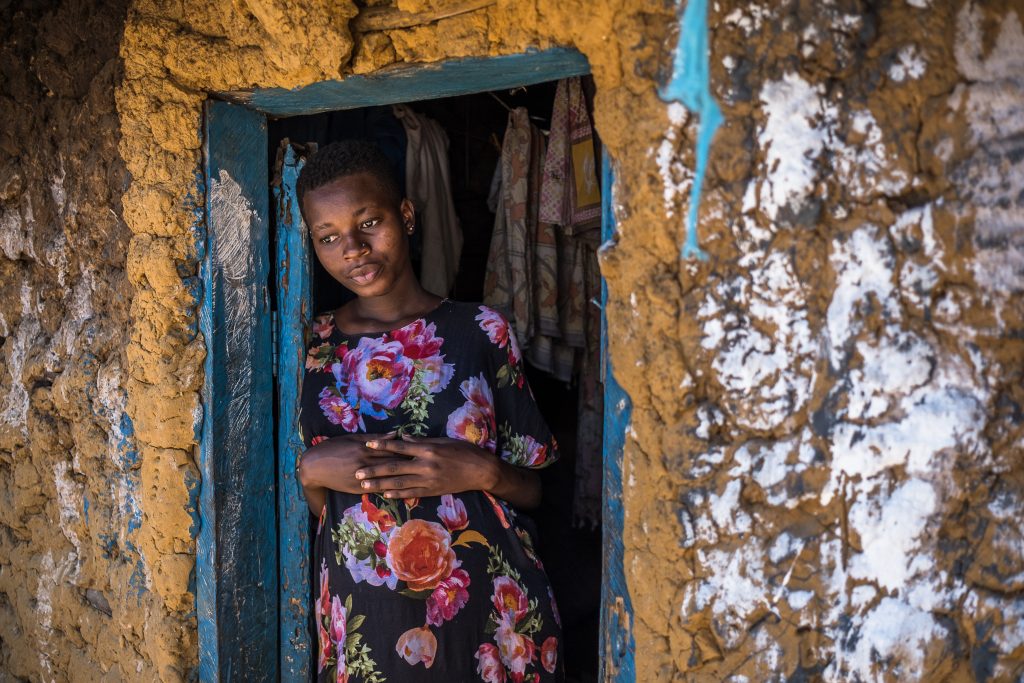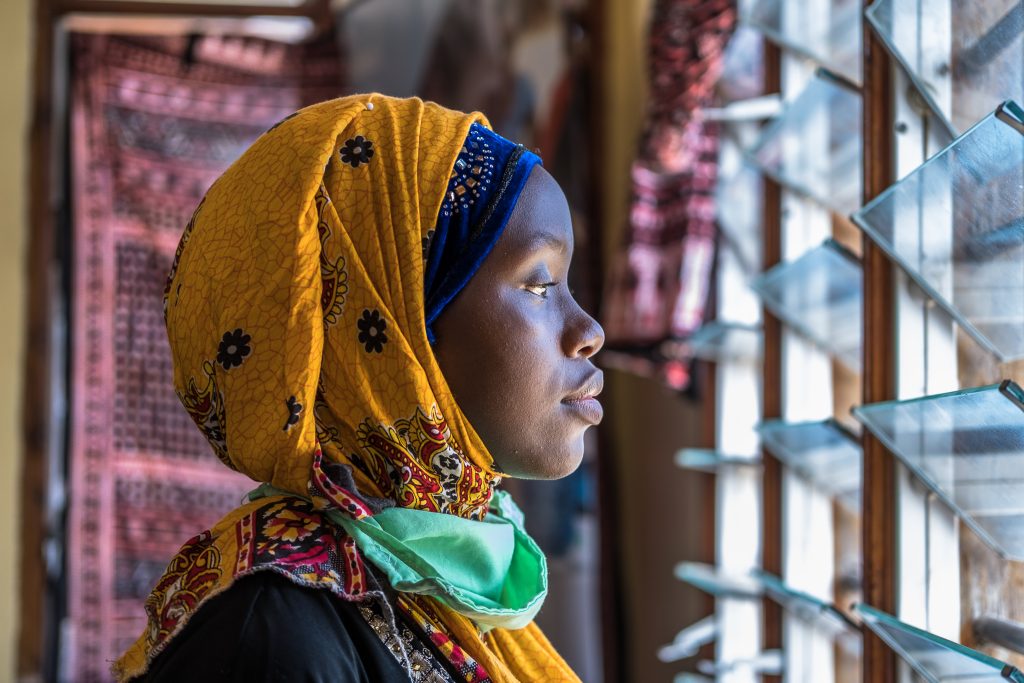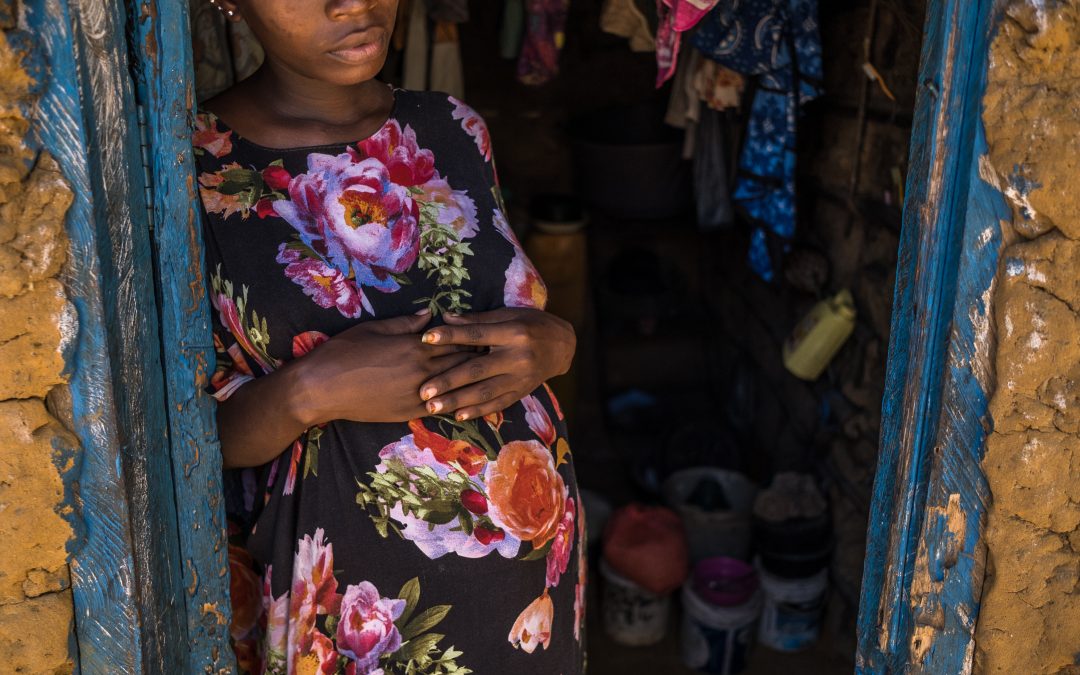In Kenya, as COVID-19 leads to an increase in unintended teenage pregnancies, we reached out and spoke with several young women facing their own uncertain futures. DSW will continue to work hard, now more than ever, to ensure that all young women and girls are empowered to control their own destinies.
By Brian Otieno and Philipp Hedemann.
“I can’t come home like this. Mama must not see me like this,” says Catherine, stroking her stomach carefully.
The curvature of her belly is now impossible to miss. Within a few weeks, she will give birth to a baby. Catherine, only 17 years old, did not intend to become pregnant. Unfortunately, Catherine is just one among hundreds of thousands of young women to have become involuntarily pregnant since the beginning of the COVID-19 lockdown in Kenya. For many, facing maternity in lockdown will be a catastrophe within a catastrophe.
Catherine was in school when the pandemic reached Kenya in March. The government issued a strict lockdown, implementing curfews, contact bans and, above all, the closure of all schools. Unfortunately, all educational institutions are still closed – and a reopening is not in sight.
In the meantime, there is home-schooling – but not for Catherine. When the lockdown was imposed, she lived with her mother in a small mud hut with no smartphone, no computer, and no electricity. Catherine wanted to flee this life and wished to live in a house with running water and electricity. She knew that an education was the only way to escape poverty – an education that she was no longer able to receive because her mother could not afford to buy a smartphone that would have enabled Catherine to attend classes over the Internet.
At first, Catherine worked through her few textbooks on her own. But soon she had read to the last page. She was bored. Seeking more, she decided to leave her small village near Lake Victoria in western Kenya and move to Mtwapa, a town 15 kilometres north of the port metropolis Mombasa, where her elder sister lived.
Catherine spent the last of her money on the two-day bus ride to the coast. When she arrived at her sister’s house, she was destitute. Then Catherine met an older man, twice her age, who seemed to be the way out. “We talked and talked. He was always there for me,” she said.
A few weeks later, Catherine, then 16, was pregnant by the 32-year-old man – and suddenly he no longer wanted to listen to the girl from the countryside. “When I told him that I was pregnant by him, he initially wanted nothing to do with it,” she said, fighting back tears.
After several long conversations, the young mother-to-be finally succeeded in convincing the man to take responsibility for his unborn child. Since then, Catherine has lived with her partner in a small apartment. He earns just enough for the two to make ends meet – but once the baby comes, there will be a host of new expenses. Catherine and her boyfriend are not sure how, in just a few weeks’ time, they will afford to buy diapers, clothes and a new mosquito net to protect the baby from malaria.
Catherine is not an isolated case. Even before the outbreak of the pandemic, almost 1in every 5 pregnant women in Kenya was under the age of 20.

Catherine Atemo, 17, lives in Mtomondoni, Mtwapa in Kilifi County, Kenya with her partner. Photo by Brian Otieno.
It has been forecast that COVID-19 could lead to an unintended baby boom in many other countries of the global south. According to estimates by aid organisations, the lockdown could lead to a staggering 40 percent increase in teenage pregnancies in Kenya alone.
The Guttmacher Institute reports that the pandemic is already having a drastic impact on the availability of contraceptives due to the interruption of supply chains. Urgently needed family planning commodities and services are in danger of being withdrawn as health resources and funds are reallocated to fight the pandemic.
The United Nations Population Fund (UNFPA) fears that coronavirus-related restrictions of six months in low- and middle-income countries will lead to as many as 7 million additional unintended pregnancies. If the restrictions are enforced for a year, this could double the number of unintended pregnancies and lead to an additional 3.3 million more unsafe abortions. Since teenage pregnancies are particularly prone to serious complications, this, according to the Guttmacher Institute, could lead to an additional 28,000 maternal and 168,000 neonatal deaths during or shortly after birth. As young women and girls who become pregnant are often forced to marry early, the UNFPA fears that the pandemic could lead to 13 million more child marriages worldwide over the next 10 years. The pandemic has the potential to undue the progress made since the 1990s in family planning as well as maternal and child health.
COVID-19 will have lifelong consequences for the many girls who became pregnant unintentionally during the lockdown. “At school, they never explained to us how to protect ourselves against pregnancy,” says Catherine with a downcast look. In many communities in Kenya, even in 2020, the value of a woman is still measured by how many children she can give her husband. Under pressure from religious and conservative forces, there is little or no family planning education in schools. The use of contraceptives is often still stigmatised as taboo, especially in rural areas.
Although she is eight months pregnant, Sylvia drags a 20-liter canister from the well to her mother’s hut, which is made of thin logs, plastered with clay and covered with palm fronds. The sun sits in the cloudless sky. Sweat runs down Sylvia’s forehead. The tropical heat is hard on her, but she is determined to cook Ugali for herself and her mother over an open fire. Her mother is the only person who supports Sylvia. The man who should help has refused.
Sylvia met the father of her child, a boy her age, in a club when she was 16 years old. She quickly fell in love with him. Although she wears traditional wide robes, Sylvia could not hide her growing belly from her mother a few months after that fateful first meeting. The resolute mother went with her daughter to the family of the expectant father. But he denied having impregnated Sylvia. “His mother said he was much too young for that. But I know for sure that he is the one,” Sylvia explains in a low voice while cooking lunch.
Sylvia’s pregnancy was not intended. “The boy never used a condom. He promised me that I wouldn’t get pregnant. I believed him. I loved him,” says Sylvia. She never learned anything about contraception. At a certain point, her single mother could no longer afford the school uniform and school fees, and Sylvia, like many of her friends, dropped out. The subject of contraceptives was never on the curriculum for her.

Sylvia Charo, 17 years, lives in Mikanjoni, Mtwapa in Kilifi County with her mother and siblings. Photo by Brian Otieno.
In Kenya, it is estimated that about one-third of all pregnant young women and girls decide not to carry the pregnancy to term. They hit their growing baby belly with full force or go to the countless illegal abortionists who administer toxic potions or tablets to desperate mothers to terminate the pregnancy. It is not uncommon for the foetus to survive this, resulting in severe deformities. In other cases, the dose is so poisonous that the expectant mother succumbs as well. Unsafe abortion is the second leading cause of death in Kenya for girls between 15 to 19 years of age. Even among girls who survive it, the procedure often causes lifelong problems such as fistulas or depression.
On her own, Sylvia would be completely overwhelmed but, with the help of her mother, she wants to give birth and be a good mother to her child. “My mother will help me. Together we can do it,” says Sylvia in a firm voice, as though comforting herself in preparation for an uncertain future – a future in which the father of her child will not play a role. “I would be afraid that he would hit me because I got pregnant. I don’t want to see him anymore and I don’t want to talk to him ever again.”
Instead, Sylvia wants to talk to her friends who used to hang out with her in dimly lit clubs. She wants to talk about contraceptives. “All the girls who have boyfriends or are sexually active should know how to protect themselves from an unintended pregnancy,” says Sylvia.
Aisha also learned about contraceptives too late. Several months ago, at the age of 16, she became the mother of a daughter. When the schools in Kenya were closed for the holidays last year, Aisha didn’t know what to do with herself. She met a boy – two years older than herself – in a club. Afterwards, the boy disappeared into the night, and within weeks it was clear that Aisha was pregnant. He probably does not know that he became a father three months ago.
Aisha, who lives near Mombasa in a hut with her elderly, ailing grandmother and hides her hair under a colourful veil, always liked going to school and wanted to go to university to become an engineer. Until she became pregnant, she had good grades. Now, it is extremely unlikely that her dream will come true. In Kenya, only two percent of the female students who leave school because of an early pregnancy return.
According to estimates by the United Nations Educational, Scientific and Cultural Organization (UNESCO), 132 million girls worldwide did not attend school before the pandemic. School closures due to COVID-19 are expected to add another 743 million schoolgirls to this number.
Mwanasiti Juma Ali knows many girls like Catherine, Sylvia and Aisha. As a volunteer health worker, she goes from home to home every day in the coastal town of Mtwapa and speaks with parents and children about family planning on behalf of the World Population Foundation (WHO). “Because the schools are closed, parents should talk to their children about contraception. But most people simply don’t do it,” says Mwanasiti Juma Ali.
Instead of talking to their children about how to protect themselves against unintended pregnancies and sexually transmitted infections (STIs) and viruses like HIV & AIDS, many parents react violently when they find out that their daughter has a boyfriend. “Many parents demand absolute abstinence from their children because they believe that contraception can make you infertile. I fight against these myths with education,” she says, herself a mother of eight children.

Aisha Douglas, 16, lives with her infant child and grandmother in Mikanjoni Village, located in Mtwapa, Kilifi County. Photo by Brian Otieno.
Through her conversations with desperate girls and young women, Mwanasiti Juma Ali knows that domestic and sexual violence against women and girls has increased dramatically since the beginning of the pandemic. The perpetrators are mostly from their own families. The interruption of violence prevention programs, lost income opportunities during the lockdown, confinement in confined spaces, and alcohol and drug use lead to dangerous situations, especially for women and girls. Marital rape, sexual assault by family members and even incest are on the rise. Because the victims usually do not dare to report the brutal crimes and teachers can no longer sound the alarm, no exact figures are available. The UNFPA fears that six months of lockdown could lead to an additional 31 million cases of gender-based violence in low- and middle-income countries.
During her daily tours, Mwanasiti Juma Ali visits the poorest households in the community. Many girls from these families received free sanitary towels at school. Since educational institutions have closed, many have offered themselves to older men for so-called “survival sex” – paid sex work to make ends meet and enable them to buy urgently needed hygiene products. Since many clients insist on unprotected sex, girls are at a high risk of becoming pregnant or contracting STIs.
Not all teenage girls who became pregnant unintentionally during the pandemic in Kenya were forced to have sex because of poverty or violence. “Many teenagers have access to the Internet and watch porn on their cell phones. There they see things that they sometimes want to try out for themselves. That’s why incest has been on the rise recently,” reports Riziki Abdallah. She works as a volunteer with the Safe Community Youth Initiative in Mtwapa, an aid organisation that advocates against teenage pregnancy and helps young pregnant women and mothers with the support of DSW. About her work, she says, “Every girl has a dream. In order to make this dream come true, they must focus on their goals. An early involuntary pregnancy or marriage and the associated dropping out of school can shatter this dream.”
The longer schools are closed, the more girls’ dreams will be shattered. Hellen Mbodze Tunje is a nurse in the health center in Mtwapa. She knows that drastic measures like school closures were necessary to save the fragile Kenyan health system from collapsing during the pandemic, but she is critical of how vulnerable teenagers were largely left to fend for themselves in this difficult time. The curve of the coronavirus may have been flattened by the government’s measures, but the curve of unintended pregnancies, child marriages and gender-based violence rose as a result.
“This shows that the government should have taken effective protective measures before closing schools,” Hellen Mbodze Tunje says. She advises girls who come to see her for a check-up to return to school as soon as it is possible again, even if they are pregnant or have a child by then. Catherine, Sylvia and Aisha also want to fulfill this dream one day.
It is because of the experiences of young people like Catherine, Sylvia, and Aisha that DSW works with the national government, county governments, young people, community leaders and civil society organisations in Kenya to secure the right of young people to sexual and reproductive health information and services.
We do this by advocating for improved policies and increased funds for family planning, and through our projects, such as Strengthening of Local Advocacy Leadership in East Africa (SLALE), which strengthens youth organisations in east Africa, and Holistic Action for Young Adolescents (HAPA) project, which seeks to increase access to sexual and reproductive health information and services for adolescents from 10 to 14 years old.

